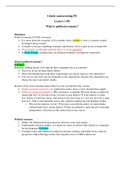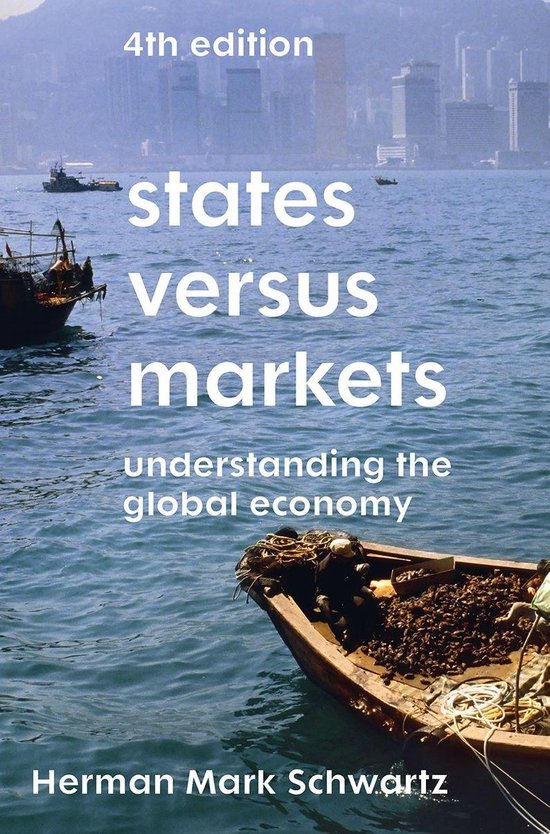Gehele samenvatting PE
Lecture 1 PE
What is political economy?
Disclaimer
Political economy IS NOT economics
➢ It is more about the essentials of for example what a market is: how is a market created,
developed and governed?
➢ A market is not just something economic and abstract, but it is part of our everyday life
➢ The economy is inherently political and so it is also normative
➢ In Susan Strange (reading) there are different normative assumptions mentioned
What is political economy?
Examples:
Starbucks, Rolling Stones, Fiat what do these companies have in common?
➢ These are in fact all legal Dutch entities
➢ Due to the globalizing world these corporations can choose where to base themselves
➢ You can see that states are not dominant of the corporations, because the corporation can
choose the most convenient country
Because of the crazy housing market almost no one can afford to buy a house.
➢ Simple economic perspective to explain this matter: there is more demand than supply.
➢ Political economist perspective: Why are houses so popular? Because money is relatively
cheap right now. If you take a loan, you have to pay interest → if the interest is really
low; money is relatively cheap. And interest rates have been at a very low level for a long
time now. That is one important reason why capital is pouring into the housing market.
o Why are the interests so low? → this has to do with the policy of central banks
(central banks have certain policies → they are related to states but also somewhat
independent: will return on this matter later in the course)
Political economy
1. Studies the fundamental interconnection between states and markets
2. Understands economic politics as a means for states to achieve their objectives (strategies
for development; Schwartz)
3. Considers today and tomorrows political economic relations and battles from a historic
perspective (like reflecting on how the economic crisis of 2008 could occur)
,The economy is inherently political.
And much of what is political, is directly related to the economy.
PE is everywhere, and everything is PE.
But if that is true… How can you study this?
Four perspectives on political economy
Political Economy 1:
The classic thinkers on state and market, and their followers.
Political Economy 2:
The political science of economic policy fields.
Political Economy 3:
Political phenomena considered from an economics perspective.
Political Economy 4:
Markets and business considered from a political science perspective (mostly what Eelke
specializes in)
(will mostly focus on 1, 2 and 4)
Political Economy 1
The classic thinkers on state and market, and their followers.
➢ They considered both states and markets, integrated in one academic debate.
➢ How should we organize a society in which we can create wealth and prosperity?
➢ Political economy originated 250 years ago, back then it was still one debate.
The Academic Divide
Some remain in the footsteps of the classics: Susan Strange (almost single-handedly rebuild PE),
Thorstein Veblen (fundamentals of economic life) and Thomas Piketty (famous for study on
inequality)
,Political Economy 2
The political science of economic policy domains
➢ For instance: governance of economic institutions (central banks, world bank) →
decision-making in economic fields and the regulation of these financial institutions
➢ Like questions about pensions, unemployment, social benefits, etc. → policy fields that
are inherently economic
➢ Also migration and climate change
Political economy 3
Political phenomena considered from an economics perspective
➢ Usually taught at economic departments
What is economics?
1. “the branch of knowledge concerned with the production, consumption and transfer of
wealth.” – Google
o Quite an alright translation
2. “a branch of the science of a statesman or legislator with the objective of providing a
plentiful revenue or subsistence for the people.” – Adam Smith
o So it is knowledge → but you have to do something with it → it is knowledge for
the statesman or legislator to organize society → very PE
3. Combining the assumptions of maximizing behavior, stable preferences, and market
equilibrium, used relentlessly and unflinchingly – Gary Becker
o Three assumptions → use those assumptions relentlessly to study economic
behavior.
o Neoclassical way of what economics is (and it makes it an approach, so it is not
necessarily a branch of knowledge)
So economics is:
1. A domain
2. A perspective and approach to study social interaction
o Demand/supply, competition; rational behavior; homo economicus; individualism
So in political economy 3 you take this economic perspective and you use it to study political
phenomena.
, Political economy 4
Markets and business considered from a political science perspective.
➢ Like how corporations are governed, how lobbying works, the corporation as a political
actor influencing law-making and regulations
➢ For example climate change is also related to corporate conduct
➢ Example: what is wealth and how do we define it? → much of the regulations here is not
done by states, but it is private regulations → people from market institutions → who
regulate themselves often → with some linked to national/transnational governance →
like the bank of international settlements or the UN
➢ Example: the role that business play in the EU → one element is for example lobbying →
the whole project of European unification does not exclusively from business interest, but
it is certainly closely tied to business interest → large companies usually have a lot of
resources and sit on the front row when there is new policy being made → business
interest are loudly in favor of European unification
Political economy as a course
1. The ingredients of PE
2. Developments in Global Capitalism
3. Real World Economics in times of crisis
Offshore financial centers / tax havens
• Low taxation
• Lenient regulation: regulation that is well suited to them
• Secrecy
• Tax avoidance vs. tax optimization: tax avoidance it now allowed, but you can optimize
something that law-makers did not think about
• Firms use complex ownership structures
• Countries/jurisdictions facilitate corporations → competition on tax rates






